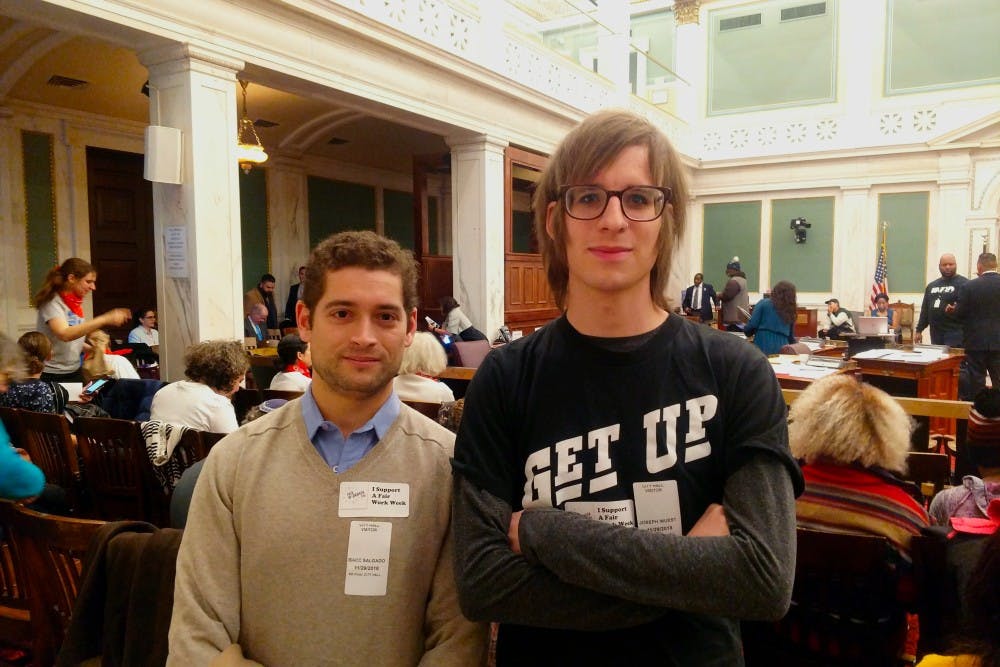
GET-UP members Gabe Solgado and Joseph Wuest at the City Hall hearing for the fair workweek bill. (Photo from Gabe Solgado)
Graduate students at Penn said that a union will not occur, after students at Columbia and Brown voted to unionize in November.
At Brown University, graduate students voted to unionize after over a year of campaigns, and at Columbia University, administrators officially recognized the student union following years of resistance. Graduate student members of Penn's union advocacy group, Graduate Employees Together — University of Pennsylvania, though, decided not to move forward in the unionization process to be recognized by Penn.
“Unfortunately, [GET-UP is] in a very different legal position [from Columbia], which means [the Columbia and Brown progress] doesn’t do much for us,” Political Science Ph.D. student and GET-UP member Gabe Salgado said.
GET-UP, founded in 2000, was revived in fall 2015 following the New York University administration's 2014 decision to voluntarily recognize the nation's first graduate student union at a private institution. GET-UP hoped the National Labor Relations Board under the Obama administration would allow the group to hold a vote recognizing Penn graduate researchers and teaching assistants as employees.
Amid these efforts at Penn, Columbia saw its own landmark decision in August 2016 when the NLRB voted to give its graduate students the right to vote to unionize, setting a precedent for private universities. In the two years since, the Columbia administration has fought the decision and did not recognize the union until Nov. 19.
The framework gives Columbia graduate workers bargaining power. However, it also requires that these students give up the right to strike until April 2020. The union agreed to accept the terms within a week.
“It’s been wonderful to see other grad campaigns continuing to build precedent and grad power across the country,” Salgado said. “It’s too bad that [the strike-ban] was part of the conditions for them to be able to move forward in terms of getting a contract.”
Despite continued university resistance, after a four-day election, Brown graduate students voted in favor of a union on Nov. 19. Upon certification of the vote, Brown must inform the NLRB that it will recognize the union.

File Photo
In an official statement on the GET-UP website before Columbia's union officially ratified the administration's framework, GET-UP urged Columbia's graduate union advocacy groups — Graduate Workers of Columbia-UAW and Columbia Postdoctoral Workers of Columbia-UAW — to vote against the bargaining contract.
“Agreeing to these terms means that GWC and CPW enter the bargaining agreement with their hands tied behind their back,” the statement reads. “This is a crucial issue and a strong indicator that Columbia is seeking to use false urgency and secrecy to undermine the union’s power.”
GET-UP member and Political Science Ph.D. student Katie Rader also said she was concerned about the logistics of the Columbia agreement.
“I don’t think Columbia is an exercise in good faith,” Rader said. “It’s not just out of benevolence that they want to start working with this.”
For both Salgado and Rader, the decisions at Brown and Columbia will likely not lead to a union at Penn anytime soon.
In the wake of the 2016 NLRB Columbia decision, the NLRB granted GET-UP the ability to hold a campus vote on unionization in December 2017. With the vote scheduled for some time in spring 2018, GET-UP decided to withdraw its petition on Feb. 15 out of fear that Penn's administration and the now Republican-majority NLRB board would not grant GET-UP status as a union — effectively overturning the Columbia precedent.
The decision to stop unionization efforts in order to protect the Obama-era Columbia precedent that students can be considered employees is a move paralleled by unions at Yale University, University of Chicago, and Boston College.
Salgado added that while the Penn administration objects to a union on the grounds that students should not be treated as employees, both he and Rader believe that decisions at other universities will not stop Penn from challenging unionization efforts.
“We still have every reason to believe that Penn will act in the same way,” Rader said.
Despite administrative resistance, GET-UP members are still optimistic for the future, with Rader calling the developments at Brown and Columbia “a step in the right direction” for the unionization movement.
Penn will not be able to “use the Trump administration to their advantage,” GET-UP member and Molecular Biology Ph.D. student Olivia Harding said.
“There is a precipitously growing population in the U.S. […] that is realizing they can question what they had taken to be dreadful-but-immutable truths about our conditions, including our working conditions,” Harding said. “I think the emotions and motivations will resonate louder and louder at Penn over the next few years.”
The Daily Pennsylvanian is an independent, student-run newspaper. Please consider making a donation to support the coverage that shapes the University. Your generosity ensures a future of strong journalism at Penn.
Donate







